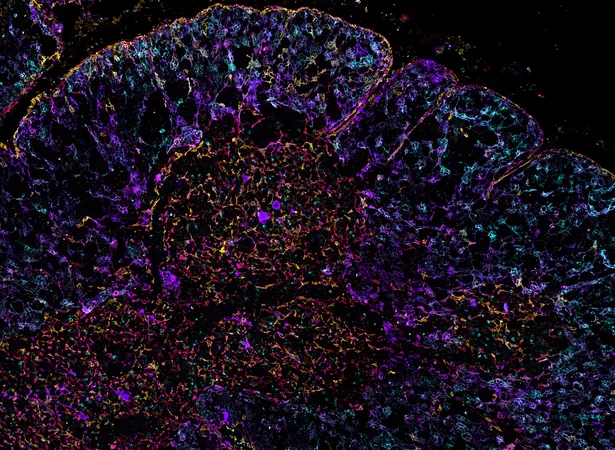
Groundbreaking Thymus Mapping Reveals Secrets to Lifelong Immunity: A Game Changer in Immune Health!
2024-11-20
Author: Sarah
Significant Breakthrough in Immunology
In a significant leap for immunology, researchers have unveiled the first-ever spatial atlas of the developing human thymus—an essential organ that plays a critical role in training immune cells to fend off infections and combat cancer.
Collaboration and Implications
A collaborative team from the Wellcome Sanger Institute, Ghent University (Belgium), and the National Institutes of Health’s National Institute of Allergy and Infectious Diseases delved deep into the peculiarities of immune cell development. Their findings, published in the esteemed journal *Nature* on November 20, suggest implications that resonate beyond basic science.
Part of the Human Cell Atlas Initiative
This innovative study forms part of the international Human Cell Atlas (HCA) initiative, aiming to create a comprehensive map of every cell type in the human body.
Early Development of the Thymus
By analyzing thymus samples from eleven weeks post-conception up until three years of age using advanced single-cell sequencing and spatial mapping techniques, researchers made a groundbreaking revelation: the thymus begins to establish its structure and function as early as twelve weeks post-conception.
Indispensable Role of the Thymus
The thymus’s role is indispensable, as it trains T cells—crucial white blood cells that defend against pathogens and malignancies—by teaching them to discern threats without harming healthy tissue.
Impact on Older Adults
Despite the thymus's significance, our understanding of its early developmental stages has been sparse due to its primary functions being confined to infancy, after which it gradually regresses.
Diverse T Cell Types
The intricate study revealed noteworthy differences in the maturation of diverse T cell types. Some T cells coordinate immune responses by signaling other immune components, while others directly engage and eliminate infected or cancerous cells.
Progenitor Cell Locations
Moreover, researchers identified progenitor cell locations that generate key support cells within the thymus.
Introduction of OrganAxis
A highlight of this groundbreaking work is the introduction of OrganAxis, a high-resolution spatial mapping method that allows for the comparison of thymus samples across various development stages with unprecedented clarity.
Future of Immune Health
The insights gained from this study are not just academic; they foster a brighter future for immune health, especially for older adults or those with specific thymus-related conditions.
Impact on Research
The research is already being applied to investigate age-related immune changes and conditions like DiGeorge syndrome, a genetic disorder that leaves children without a functioning thymus.


 Brasil (PT)
Brasil (PT)
 Canada (EN)
Canada (EN)
 Chile (ES)
Chile (ES)
 España (ES)
España (ES)
 France (FR)
France (FR)
 Hong Kong (EN)
Hong Kong (EN)
 Italia (IT)
Italia (IT)
 日本 (JA)
日本 (JA)
 Magyarország (HU)
Magyarország (HU)
 Norge (NO)
Norge (NO)
 Polska (PL)
Polska (PL)
 Schweiz (DE)
Schweiz (DE)
 Singapore (EN)
Singapore (EN)
 Sverige (SV)
Sverige (SV)
 Suomi (FI)
Suomi (FI)
 Türkiye (TR)
Türkiye (TR)